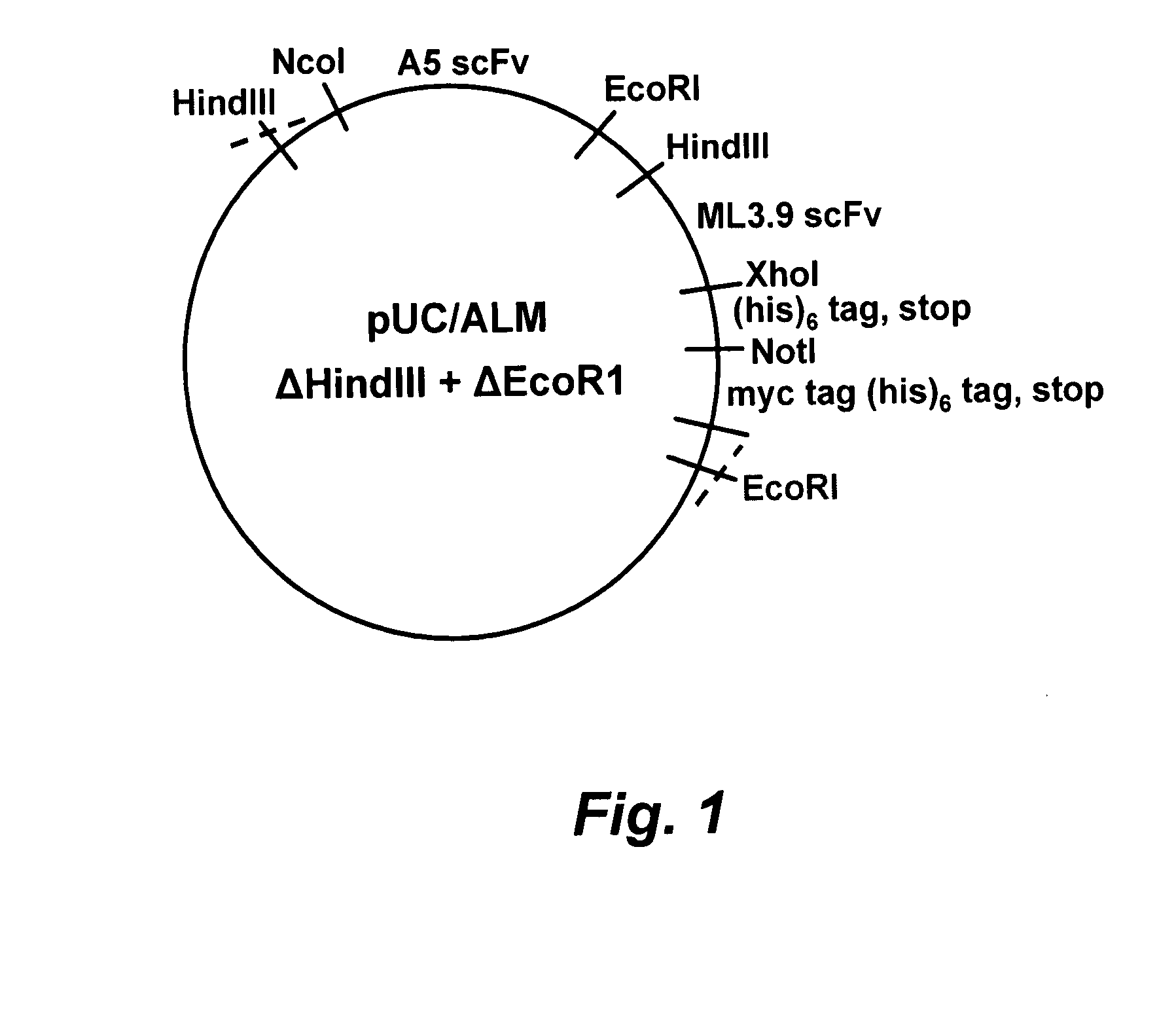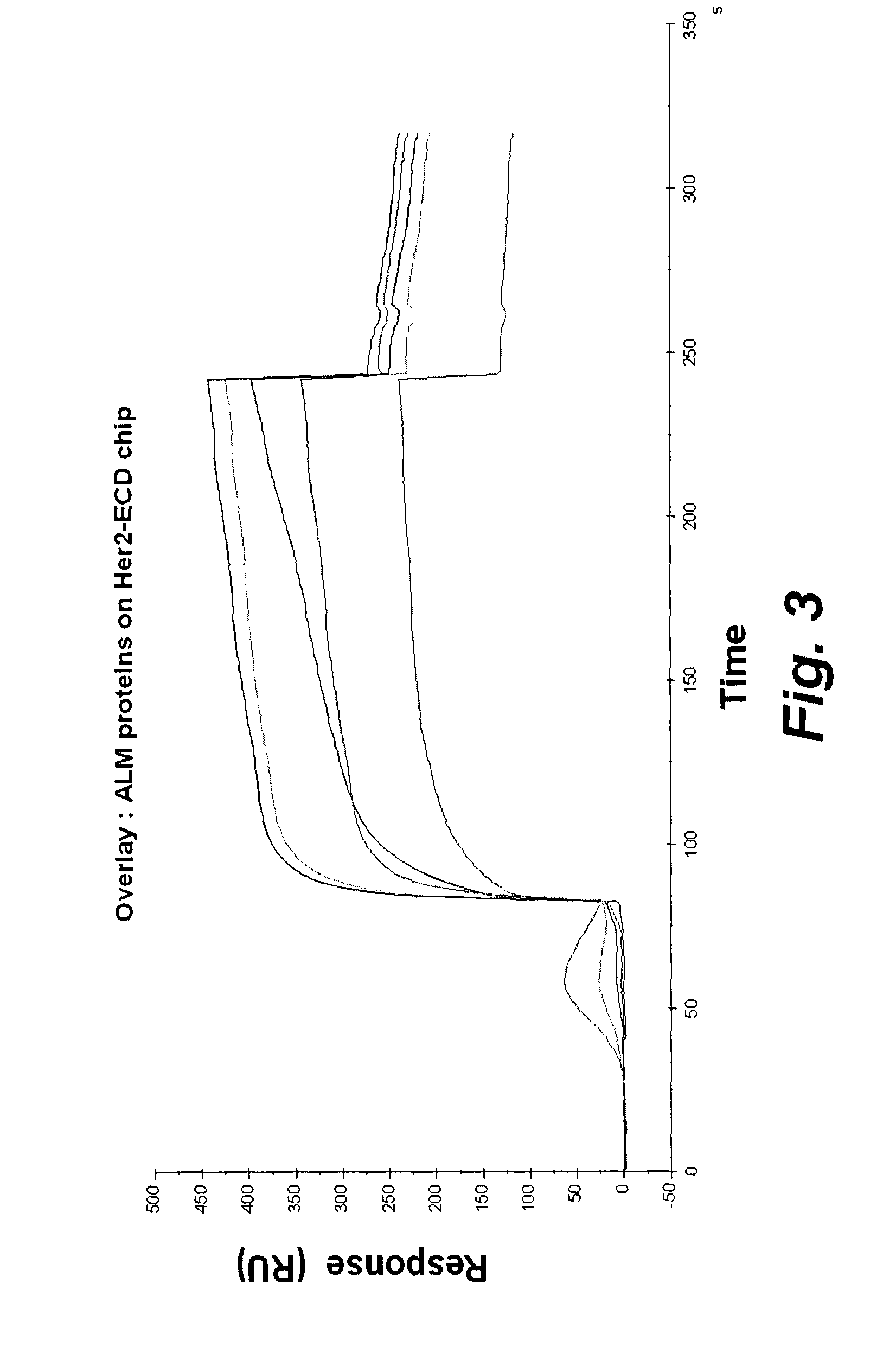Anti-egfr family antibodies, bispecific Anti-egfr family antibodies and methods of use thereof
a family of antibodies and anti-egfr technology, applied in the field of immunology and oncology, can solve the problems of significant morbidity and mortality, expensive drug treatment, etc., and achieve the effect of inhibiting the growth and/or proliferation of the target cell
- Summary
- Abstract
- Description
- Claims
- Application Information
AI Technical Summary
Benefits of technology
Problems solved by technology
Method used
Image
Examples
example 1
Preparation of Bs-Scfv Antibody Molecules
[0266]Overexpression of EGFR and HER2 / neu has been correlated with a poor prognosis in many solid tumors. Antibodies that perturb signaling through these receptors, such as Herceptin7 (anti-HER2) and C225 (anti-EGFR), have demonstrated significant utility in the treatment of cancer. Signal transduction through members of the EGFR family (EGFR, Her-2 / neu, Her3 and Her4) is dependent upon the formation of homodimers, heterodimers or heterogenous multimers of these receptors triggered by the binding of ligand. Bispecific scFv antibody molecules that engage multiple epitope pairs of these receptor proteins have been generated as described herein below for use in preventing formation of these signaling complexes in cancerous tumor cells.
Materials and Methods:
[0267]The following materials and methods are provided to facilitate the practice of the present invention:
[0268]Cloning:
[0269]The genes coding for single chain Fv (scFv) antibody molecules sp...
example 2
Combined Chemotherapeutic Approaches
[0288]HER2 / neu is a compelling target for combined chemotherapy approaches as it is overexpressed in a variety of tumors and its overexpression has been correlated with a poor prognosis. While HER2 / neu lacks a ligand that can trigger signaling through its tyrosine kinase domain, when overexpressed at high concentrations, HER2 / neu can spontaneously form homodimers (Yarden and Sliwkowski (2001) Nature Reviews, Molecular Cell Biology 2: 127-137). HER3 is in many ways the opposite of HER2 / neu. It actively binds to ligand but lacks a functional tyrosine kinase domain, thus requiring heterodimerization with HER2 / neu for signaling. In fact, this combination is believed by many to be the most potent of the signaling complexes formed by the members of the EGFR family (Lohrisch and Piccart (2001) Sem. Oncology (28) Suppl 18: 3-11).
[0289]Many chemotherapeutic agents lead to damage that in a normal cell will trigger apoptosis. However, some tumor cells have a...
example 3
In Vivo Efficacy of 211At-Labeled Bispecific scFv
[0290]An in vivo study was conducted to evaluate the efficacy of 211At labeled bispecific scFv against tumors. The bispecific antibody as labeled using 211At-SAPS chelate (N-(4-[211At] astatophenethyl) succinamate) (see, e.g., FIG. 10).
[0291]Four days before injection of BT474 breast cancer cells, mice were implanted with a β-estradiol tablet. On day zero, the mice were injected with 5×106 BT474 breast cancer cells. On day 14, the first therapeutic dose of 211AT conjugated bispecific antibody (ALM) was administered i.p. at a high dose of 80 μg and at a low dose of 10 μg. Subsequent therapeutic doses were administered on day 16 and on day 18. Tumor volume was then tracked as shown in FIGS. 11A through 11C.
[0292]Tumor volume was generally lower in the treated animals (FIGS. 11B and 11C) as compared to the untreated control (FIG. 11A).
PUM
| Property | Measurement | Unit |
|---|---|---|
| Volume | aaaaa | aaaaa |
| Nucleic acid sequence | aaaaa | aaaaa |
| Light | aaaaa | aaaaa |
Abstract
Description
Claims
Application Information
 Login to View More
Login to View More - R&D Engineer
- R&D Manager
- IP Professional
- Industry Leading Data Capabilities
- Powerful AI technology
- Patent DNA Extraction
Browse by: Latest US Patents, China's latest patents, Technical Efficacy Thesaurus, Application Domain, Technology Topic, Popular Technical Reports.
© 2024 PatSnap. All rights reserved.Legal|Privacy policy|Modern Slavery Act Transparency Statement|Sitemap|About US| Contact US: help@patsnap.com










